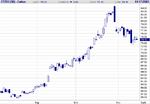Bra Spat
By Rene Pastor
NEW YORK, Nov 19 (Reuters) - The "bra spat" between the
United States and China won't cause a sag in U.S. cotton sales
to the Asian giant, even if it does spur some snags in the
short run, analysts said.
On Tuesday, Washington slapped curbs on imports of bras,
robes and other knit-fabric clothing from China.
On Wednesday, China called off an impending U.S. trip by a
cotton buying delegation.
Quickly dubbed the "bra spat" by the industry, the
tit-for-tat trade tiff between the two countries should at most
cool, and temporarily at that, the pace of cotton purchases by
China's textile mills, according to industry analysts.
That's because the Chinese are still facing a woeful
shortage of fiber due to a disastrous crop. Equally important,
the only major source of cotton going into 2004 is the United
States, the analysts said.
"I don't think there's any country that has the quantity
and quality of cotton that we could provide," Carl Anderson, an
influential economist at Texas A&M University, told Reuters in
a phone interview.
The U.S. Department of Agriculture, in its closely followed
monthly November supply/demand report, said China's cotton
production will reach 22 million (480-lb) bales, down sharply
from the 25.5 million bales forecast last month <WASDE25>.
Chinese consumption of cotton is expected to hit 30.20
million bales, with imports expected to hit 7.0 million bales,
the USDA said.
Because China is simultaneously the world's largest
producer and consumer of the fiber, cotton futures on the New
York Board of Trade shot to an 8-year high of 86 cents a lb at
the height of the Chinese buying frenzy last month.
Cotton futures for March delivery on the exchange were
fetching 76.15 cents a lb on Wednesday afternoon after falling
more than 2 cents on Tuesday on Washington's curbs.
The dispute with Washington prompted China to cancel, for
now, the visit of a delegation to buy U.S. cotton. This
happened against the backdrop of Chinese officials warning of
retaliation.
Shi Jianwei, director of China's Cotton and Jute Bureau,
said the dispute could "reduce some of China's purchases of
U.S. cotton in the short term."
However, Mark Lange, president of the National Cotton
Council, said his trade group was getting "confused messages
out of China" about the delegation's visit.
"It seems the cotton buyers will still be able to make
their trip," Lange said, adding the NCC planned clarify this
with officials in China, maybe by the end of the week.
U.S. ONLY MAJOR SOURCE OF COTTON FOR CHINA
Nonetheless, the bigger problem for China is that the list
of alternate sources of cotton in the world is slim or almost
nonexistent at the moment, the analysts said.
So far, the USDA said the Chinese have bought more than 2.5
million running bales (RBs), each weighing 500 lbs, of cotton
from the United States alone.
In contrast, China's cotton purchases from the U.S.
amounted to a bit over 300,000 RBs a year ago.
Trade sources said the Chinese have also bought about 2.0
million bales from West Africa. But that may have tapped out
exportable supplies from this region.
That means China's mills may have to buy another 1.0
million bales, if not more, from the United States.
And the list of competitors to U.S. cotton is shrinking.
USDA reduced its estimate of the crop in Pakistan to 7.9
million (480-lb) bales from last month's estimate of 8.35
million bales. And it halved its forecast of Pakistani exports
to 50,000 bales from October's estimate of 100,000 bales.
The U.S. farm agency estimated India's exports at 100,000
bales which would merely whet China's appetite for the fiber.
Meanwhile, Australia's crop got hit by drought and the
continent is expected to ship a lot less cotton as a result.
The crop in Uzbekistan, the world's second largest cotton
exporter, hit an all-time low of 2.86 million tonnes from 3.2
million tonnes in 2002, an official told Reuters in Tashkent.
Analysts said China's recent heavy buying should enable it
to refrain from doing any immediate buying. But this would
change by early 2004 when China's mills would need to book
orders after their stocks run down.
"You're not going to kill this because of a few diplomatic
flaps," Mike Stevens of Swiss Financial Services in Mandeville,
Louisiana, said in a separate interview.
Sharon Johnson, cotton expert for Frank Schneider and Co.
Inc. in Atlanta, Georgia, told Reuters that while the Chinese
could pick up small amounts of cotton from other sources, the
only large source of cotton remains the United States.
"You can go to all the mom-and-pop stores," Johnson said,
alluding to the other cotton-producing nations, "But it's much
easier to buy at Wal-Mart."
She said the United States is the world's biggest and most
reliable supplier of cotton.
And if China does cancel the cotton delegation's visit?
"I don't think it makes any difference at all," said one
cotton broker who deals extensively in the Asian cotton
business.
"All the big merchants already have their offices in China
or Hong Kong. The Chinese don't have to come here to do all the
deals they need to do. In a word, the delegation's trip is
really for show," the broker explained.



